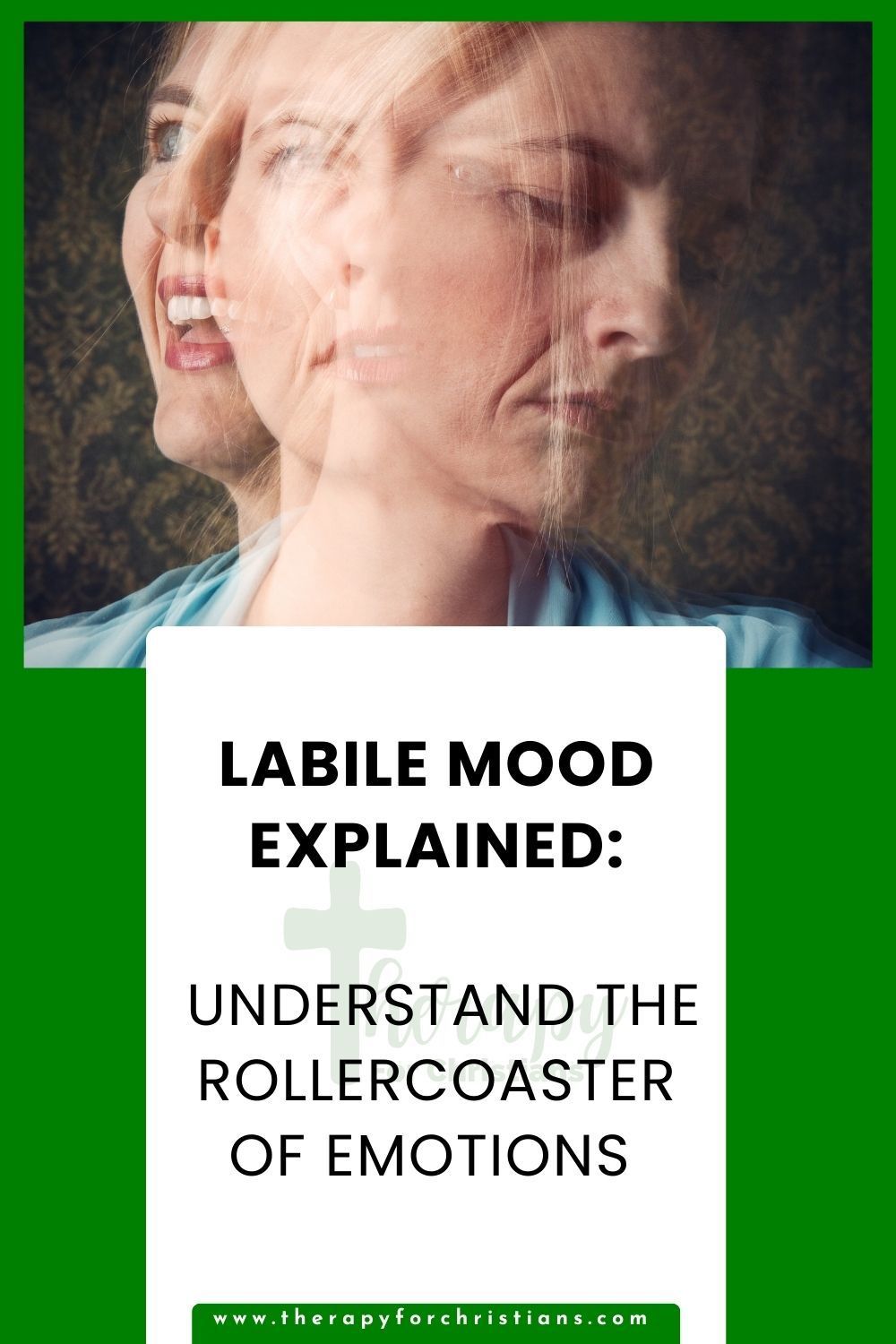
Have you ever laughed or cried uncontrollably without a clue of why it happened? Have you seen this happen to a loved one? If you answered yes, you may have witnessed or experienced a labile mood.
Two million Americans live with a labile mood but very few know exactly what it is. A labile mood is a complicated condition that is very important to learn about.
In this article, we'll talk about what is emotional lability, what the signs are, and how to cope with it. So whether you think you or a loved one may have experienced it, or you're just curious, keep reading.
What Does a Labile Mood Mean?
A labile mood is a disorder that causes people to cry or laugh at inappropriate times or situations. The condition involves intense emotions that can change rapidly, almost without warning.
The word labile itself means to "readily or continually undergo a chemical, physical, or biological change or breakdown." In simpler terms, it means to be unstable.
There are multiple names for a labile mood, the most common being emotional lability. Other names include emotional dysregulation, labile affect, emotional incontinence, pathological laughing and crying, pseudobulbar affect, and involuntary emotional expression disorder (IEED).
A person with a labile mood may lose awareness of their own emotions and become completely insensitive to their surroundings. Besides laughing or crying, they could also become aggressive, angry and violent.)-(1).jpg)
What is Affective Lability?
Affective lability is a term used to describe disorders that affect a person's mood. ADHD and other anxiety disorders are good examples of affective lability.
People with these disorders can be emotionally unstable and randomly change their moods. You may also see them act out emotionally at inappropriate times and places, just like with labile moods.
What is the Difference Between Labile Mood and Affect?
If you're wondering if there's a difference between a labile mood and affect, there isn't.
The words are used interchangeably because the 'mood' is a momentary state of mind, while the 'affect' is an external expression of emotions. Labile by definition is a combination of both which makes it the same thing.
What Causes Labile Moods?
Labile moods can be caused by many mental health conditions or affective disorders. Here are some of the most common mental illnesses that cause mood swings:
Bipolar Disorder - a person with bipolar disorder will have regular mood changes.
Personality Disorders - personality disorders cause ongoing mood swings.
Other Mental Health Conditions - depression, anxiety, and ADHD can all cause unexpected changes in your mood as well.
Traumatic Brain Injury - a brain injury can cause a stroke, fracture, dementia, and many other illnesses. But, they can also cause mood swings.
External Factors: it's easier to figure out why you have a labile mood when you've been diagnosed with one of the above. However, it can happen due to external factors as well. These include too much stress or noise, anxiety, grief, or a traumatic experience.
The Symptoms and Signs of a Labile Mood
The most evident sign or symptom of a labile mood is uncontrollable crying or laughing. The person may want to stop doing it but they will be unable to.
Another symptom is to start crying and then laughing or vice versa. The emotions come out of nowhere and usually pass quickly.
The emotions they express may even be completely unrelated to how they feel. Still, they are unable to control any of it.
How Is Labile Mood Diagnosed?
Mental health professionals use the DSM-5-TR to diagnose disorders that cause mood lability. The DSM-5-TR stands for The Diagnostic and Statistical Manual of Mental Disorders. This is a handbook used by all mental health professionals in the United States. To diagnose someone with a condition that causes mood lability, a therapist will have to conduct a mental status exam and ask questions to obtain the person's history.
Standard questionnaires and scales will be used but the therapist will also look at certain diagnostic criteria. One neurological condition that causes mood liability is Pseudobulbar affect (PBA). PBA causes uncontrollable crying or laughing and receives a stand-alone diagnosis. The diagnostic criteria for PBA are:
- Emotional outbursts that do not relate to the situation
- Expression of emotions that are not felt
- Emotional episodes that regularly ramp up then slow down
- Outbursts that cause considerable distress and interfere with daily functioning
- Symptoms are not a side effect of medications
When seeing a professional about your labile moods be sure to answer every question fully and honestly. This will help get to the bottom of your condition sooner than later.
Does Mood Lability Go Away?
Yes, a labile mood can be avoided if you use coping techniques o prevent them. If it's a mild case, the coping tips will be enough to keep the inappropriate mood swings at bay.
However, if the case is more severe, you might need to see a doctor and possibly take medication. Without intervention from a professional, things could get worse, which is why it's best to get help as soon as possible.
How to Cope With Mood Lability?
Being aware of your mood lability is the first step to coping with it. The fact that you are here means step one is done, step two is practicing what you read. Here are a few coping tips to help you avoid mood lability:
Pray
Prayer should always be your first response and not your last resort. So one way to cope with mood lability is to pray. Pray every day. Actually, pray as much as possible. Pray before you leave your home or jump out of your car, pray also before you interact with people. Just continue to pray and ask God to help you keep a stable mind through the day.
Pause and Take a Break
One of the biggest triggers of emotional lability is stress. So if you find yourself in a situation that becomes too stressful, pause and take a break. Go for a walk, calm yourself down, breathe, and just pause for some time. This will help you avoid an episode at an inappropriate time.
Practice Mindfulness
Research has shown that mindfulness improves mood lability. So another coping tip is to practice mindfulness regularly. Try your very best to be present in every moment.
Breathing Techniques
Practicing breathing techniques is another way to reduce labile mood tendencies. By slowing down and focusing on your breath you will become much calmer than before.
Know your Triggers
The best way to prevent mood lability is to avoid the things that trigger them. Now you won't be able to avoid something you don't know about, so it's important to know what triggers you. If you can figure out what triggers you, you can figure out how to avoid it thus minimizing the odds of an outburst.
Find a Distraction
If you can't avoid the thing that triggers you, find a way to distract yourself. One easy way to do that in any situation is to count your breath.
Explain Your Situation to Others
Sometimes the thought of having an episode around people makes you more anxious. To avoid feeling that anxiety, explain your situation. It can be as simple as saying, "I have a medical condition that causes me to laugh or cry sometimes, if you see me do that, please just ignore it." This will help them understand it better and rid you of your anxiety at the same time.
How Therapy Can Help Labile Moods?
If none of the coping techniques seem to be working for you, seeing a therapist is the next best step. A mental health professional will help you figure out why this is happening to you. They will also help you figure out what your triggers are and show you how to deal with them. If all else fails, these professionals will prescribe medications that help minimize episodes.
How Medication Management Can Help Labile Moods?
If you are prescribed medication it would usually be for the underlying conditions that are causing the mood lability.
If it's caused by bipolar disorder you would get mood stabilizers. If it's caused by PBA, depression, or other mental illnesses you will get antidepressants. These drugs adjust the amounts of neurotransmitters in the brain which help with emotional regulation.
The most commonly prescribed meds include Remeron (mirtazapine), Wellbutrin (bupropion), and Luvox (fluvoxamine). Pseudobulbar affect (PBA) is also treated with Neudexta (dextromethorphan-quinidine), a medicine that lowers mood lability symptoms.
If you're interested in talking with a medical doctor about how medication can be used to help you or a loved one, you can search our directory of Christian psychiatrists here.
Final Thoughts on Labile Moods
Remember, there's absolutely nothing wrong with asking for help when you need it. Yes, God is with you and He always will be. But He has also placed and equipped people on this earth to help His children when they need help. So if you're worried about your condition or the condition of a loved one, choose to get some help today.
Before you leave, we would appreciate it if you helped us spread the word by sharing, tweeting, pinning, etc. this post.
About the Author:
 Corine Williams, Ph.D. is Clinical Psychologist that is currently seeing clients through www.doctorondemand.com. However, her passion is to write books that educate, uplift, and help provide parents with a tool to talk about difficult subjects. You can find out more about her at www.booksbycorine.com or by visiting her amazon profile here: https://www.amazon.com/Corine-Hyman/e/B00AWZ5FL2
Corine Williams, Ph.D. is Clinical Psychologist that is currently seeing clients through www.doctorondemand.com. However, her passion is to write books that educate, uplift, and help provide parents with a tool to talk about difficult subjects. You can find out more about her at www.booksbycorine.com or by visiting her amazon profile here: https://www.amazon.com/Corine-Hyman/e/B00AWZ5FL2
Help us increase mental health awareness in the Christian community by donating through our paypal link here: www.paypal.com/therapyforchristians, joining our mailing list by clicking below, or join our provider list here: Provider listing
Disclaimer: the information, including but not limited to, text, graphics, images and other material contained on this article are for informational purposes only. No material on this site is intended to be a substitute for professional medical advice, diagnosis or treatment. If you are looking for a Christian counselor near you, please check out our directory located here: Christians Therapist Near Me.
Featured Christian Therapists
Specialty Psychiatrist or Nurse Practiti... Located in Phoenix, AZ
View Listing.png)



.jpg)









